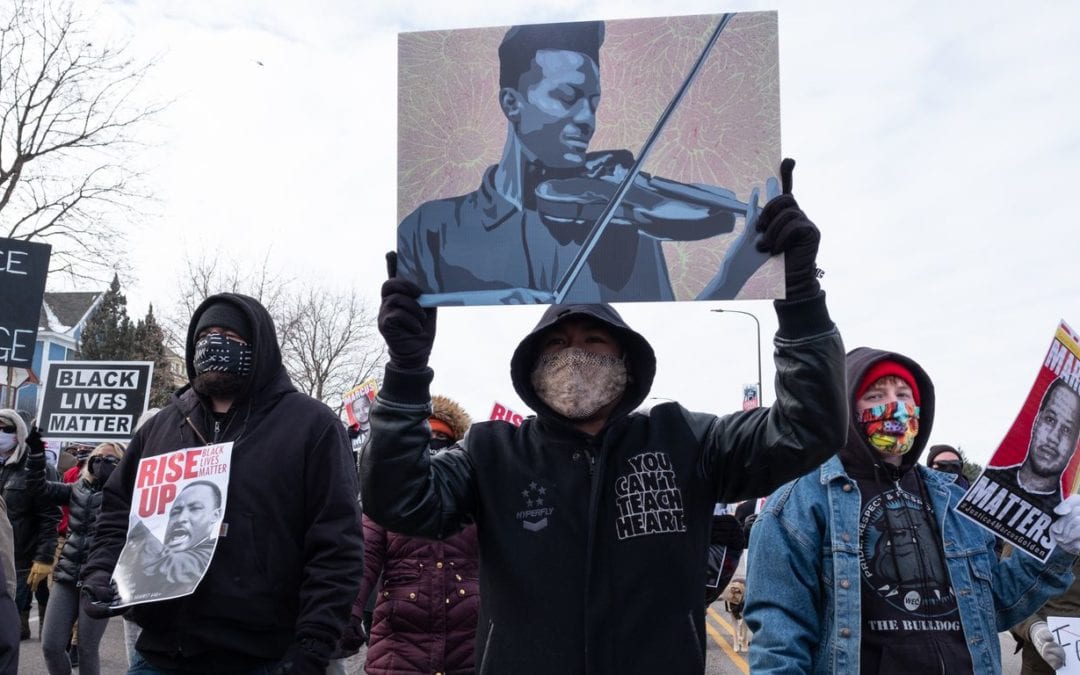Police in Aurora, Colorado, had no legal basis to stop, frisk or use a chokehold on Elijah McClain, a 23-year-old unarmed Black man who died in custody in 2019, according to a report by independent investigators released Monday.
Driving the news: The City Council in the Denver suburb ordered the independent review in June amid nationwide protests over the police killing George Floyd and other Black people.
Background: Three police officers responding to a call about a suspicious person stopped and restrained McClain, who was walking home from a convenience store on Aug. 24, 2019.
- The officers put him in a chokehold and paramedics gave him 500 milligrams of ketamine.
- McClain suffered cardiac arrest and was eventually declared brain dead. He was taken off life support on Aug. 30, 2019.
- An earlier investigation by the police department concluded the three officers did not violate any policies.
What they found: “The body worn camera audio, limited video, and Major Crime’s interviews with the officers tell two contrasting stories,” the review panel said in its report, published Monday.
- “The officers’ statements on the scene and in subsequent recorded interviews suggest a violent and relentless struggle,” the investigators found.
- But the “limited video, and the audio from the body worn cameras, reveal Mr. McClain surrounded by officers, all larger than he, crying out in pain, apologizing, explaining himself, and pleading with the officers.”
- “The audio of the incident records Mr. McClain crying out in pain, apologizing, vomiting, and at times sounding incoherent. His words were apologetic and confused, not angry or threatening.”
- “He told officers he had his ID, that his name was Elijah McClain, and that ‘I was just going home…I’m an introvert and I’m different. Going home…I’m just different. I’m just different. That’s all. That’s all I was doing. I’m so sorry.'”
Investigators also found that previous reviews of the officers’ conduct were flawed.
- “The interviews conducted by Major Crime were neither probing nor objective. The officers involved were not asked key questions about their conduct or the justification for their actions. At times, questions appeared designed to elicit specific exonerating ‘magic language’ from the case law,” the investigators wrote.
- “In addition, the report of the Major Crime Unit stretched the record to exonerate the officers rather than present a neutral version of the facts,.”
What they’re saying: The independent review “makes clear what was already known: Elijah should never have been stopped by the police, never have been arrested, never have been subjected to extreme force by the police and should never have been forcibly injected with ketamine,” lawyers for McClain said in a statement.
- “Aurora is responsible for Elijah’s tragic death by virtue of its employees’ unlawful and unconscionable actions,” the lawyers added.
- “Sheneen McClain is grateful that this independent investigation has laid bare the wrongdoing of Aurora employees who are responsible for the death of her son. She continues to call for Aurora to hold its employees accountable.”
- “Elijah committed no crime on the day of his death, but those who are responsible for Elijah’s death certainly did.”
Go deeper: Elijah McClain’s family sues Aurora police and paramedics
This content was originally published here.

